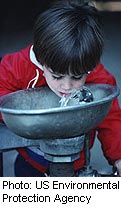
SATURDAY, Sept. 25 (HealthDay News) — Children in the United States are not drinking as much water as they should, and the deficiency can have far-reaching implications, a new study suggests.
“Even mild dehydration can affect physiological function, and cause fatigue, muscle weakness, headaches and dry mouth,” said Samantha Heller, clinical nutrition coordinator at the Center for Cancer Care at Griffin Hospital in Derby, Conn., who was not involved in the study.
Impaired cognitive and mental performance are also linked to inadequate hydration, said Heller.
According to the study, published in the October issue of the American Journal of Clinical Nutrition, only 15 to 60 percent of boys and 10 to 54 percent of girls, depending on age, drink the minimum amount of water recommended by the U.S. Institute of Medicine.
Children obtain much of their water from sweetened beverages rather than plain old H2O, the researchers found. And those who drink the most plain water consume fewer sweetened beverages and eat fewer high-calorie foods.
For the study, Ashima K. Kant from Queens College of the City University of New York and Barry I. Graubard of the U.S. National Cancer Institute looked at the water intake of 3,978 boys and girls, aged 2 to 19 years, who had been included in a national nutrition study from 2005 to 2006.
Included in their analysis was water itself, water in moist foods, and moisture in all beverages and nutritious drinks such as milk and juice.
The investigators found that water intake from all sources varied by age: 2- to 5-year-olds drank 5.9 cups a day; 6- to 11-year-olds got 6.8 cups, and 12- to 19-year-olds consumed 10.1 cups daily. Girls generally drank less than boys, Kant and Graubard noted.
Kids of all ages are more likely to drink beverages than water at mealtime, the findings suggest. More than two-thirds of water consumption was derived from beverages with main meals, while only one-third of the plain water was consumed with meals, the researchers found.
“Our results suggest age differences in the extent of water contributed by different sources to the diets of American children,” the study authors wrote. “The quality of food selections reported in association with plain water intake was better than that reported with increasing beverage moisture, and the strength of these associations varied with age,” they added.
“Efforts to moderate the consumption of sweetened beverages and promote plain water intake should not only continue to promote plain water for snacks but also should recognize the importance of replacing nonnutritive beverages at meal time with plain water,” Kant and Graubard concluded.
As the children got older, consumption of plain water increased while intake of nutritive beverages, such as milk, decreased, the researchers found.
Water makes up 55 to 75 percent of total body weight, said Heller. “We cannot live without water for more than a few days because our bodies cannot store water. Thus, it is essential we replace the water our bodies lose every day.”
Heller, a nutritionist and dietitian, advises starting children on water early.
“Give them water instead of sweetened beverages during the day and between meals,” she said. To make it more appealing, put sliced cucumbers, oranges, lemons or strawberries in ice water, she suggested.
And if your child is hooked on sodas, she advised transitioning to seltzer or flavored seltzers instead.
More information
For more information on healthful diet, visit the U.S. Department of Agriculture.

